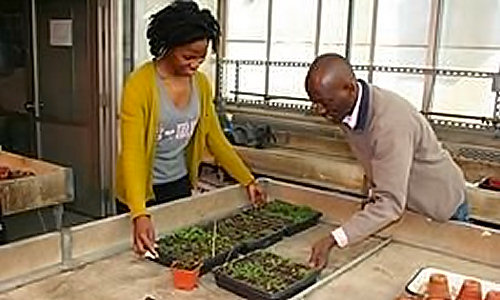Sometimes, research yields unexpected results. At Rutgers University–Camden, a group working together to decipher the genetic basis of cell shapes in plants made a remarkable discovery: a new gene.
Lyla Jno Baptiste (left) and Prof. Simeon Kotchoni look over Arabidopsis thaliana, in which they found a new gene.
The gene, named GIGANTUS1 (or GTS1 for short), is a member of a protein family that controls seed germination, growth, and biomass accumulation in plants. Essentially, it helps plants regulate growth.
“Plants must tightly regulate their cellular functions to grow and cope with constantly changing environmental conditions, but exactly how this occurs is largely unknown,” says Simeon Kotchoni, an assistant professor of biology at Rutgers–Camden.
To address the question, a group of students in Rutgers–Camden’s Computational Biology Summer Program analyzed thousands of genes governing cell shape patterning and growth in a model plant known as Arabidopsis thaliana, which shares traits with a large number of other plant species. The students came across the GTS1 gene during their work last summer and their findings were published in January in the journal BMC Plant Biology.
“It’s amazing to be part of such an exciting discovery,” says Lyla Jno Baptiste, a senior Rutgers–Camden biology major from North Brunswick. “Doing research like this can be life changing. It proves that research isn’t just some abstract thing. It can have real significance.”
The breakthrough discovery is important because it could help engineer important crops like corn and rice.
“It could reduce the amount of time needed for crop growth cycles in the plants we depend on for food,” Jno Baptiste says. “We could also use this discovery to create sustainable energy. If we can increase plant biomass production, then we can increase biofuel production and reduce our dependence on conventional fuel sources like oil, which in turn reduces their negative effects on the environment.”
Jno Baptiste was one of three students to work on the research project last summer. The team also included Kelle-Shae Bryson (Westampton/Burlington County College) and Sarah Kamal (Sewell/Camden County College). All three students were among 10 undergraduates who participated in Rutgers–Camden’s Computational Biology Summer Program last June through August. The 10-week study is funded by the National Science Foundation and falls under its Research Experiences for Undergraduates program.
Four different research projects fusing the biological sciences, mathematics, computer science, chemistry, and physics were performed during the summer program, which is open to undergraduates from all over the United States.
“A discovery like this one demonstrates that research done at Rutgers–Camden, and research done through this summer program, can have worldwide impact,” says Benedetto Piccoli, the Joseph and Loretta Lopez Chair in Mathematics at Rutgers–Camden and Ph.D. program director for Rutgers–Camden’s Center for Computational and Integrative Biology. “It shows that undergraduate research can have amazing results.”
Jno Baptiste, who is working as an assistant in Kotchoni’s lab, is continuing her research on the new gene this semester. She hopes the additional work unlocks new information about growth and biomass accumulation in plants.
“Scientists can devote several years to pinpointing the genes that contribute to growth in specific plants, but they can now apply the findings from our work, in which we used a model plant species, to various other plants,” Kotchoni says. “It will be interesting to study the GIGANTUS1 gene function in agronomically important crops with the aim of improving crop yield and biomass accumulation.”
The Rutgers–Camden Center for Computational and Integrative Biology combines the expertise of researchers from traditional biomedical disciplines — such as biology, chemistry and psychology — with the analytic methods employed by mathematicians, physicists and computer scientists to understand how individual biological systems work.
Story Source:
The above story is based on materials provided by Rutgers, The State University of New Jersey.





